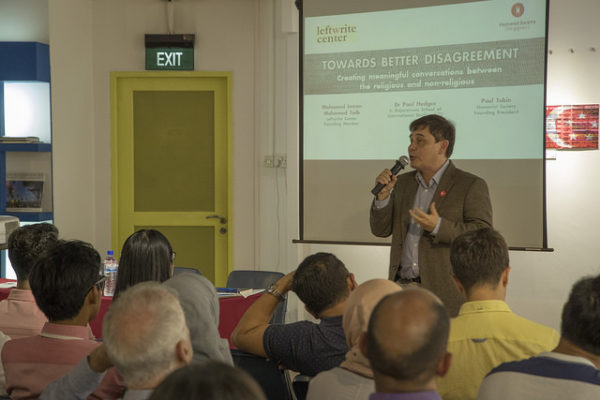Speaking at the launch of Dr Paul Hedges’ book, Towards Better Disagreement: Religion and Atheism in Dialogue, Humanist Society founding President Paul Tobin said there is a need in Singapore for the voices of non-believers. Although this group forms about 18.5% of the Singapore resident population, they have been left out of national discussions.
Although there are non-religious people in every society, some of them have taken a step forward by calling themselves humanists, said Mr Tobin. The label ‘humanism’ describes how non-believers feel about our lives as human beings, how we have the right and obligation to lead a life meaningfully without religion. It also shows how the non-religious and lead a moral and joyful life without supernatural beliefs.
The label ‘humanism’ is relatively new, emerging in the 16th century. However, the idea that one can have a moral life without God or gods is very ancient. It can be found in Greek philosophy and Indian traditions which are secular and humanistic. The Middle East has also produced great poets and thinkers, such as Omar Khayyam, who were quite secular. Thus, humanism cuts across cultures and it’s not just an import from the West, said Mr Tobin. It is a human alternative to religion.
Mr Tobin hopes that the religious and non-religious can have conversations without wanting to hit or kill each other, or making a police report. The relationship between the religious and the non-religious throughout history has been rocky. For example, in the 16th century, Giordano Bruno was put to the stake for being a non-believer. In the Muslim tradition, a man called ibn Dirham was called a zindiq (non-believer) and killed for being a non-believer. In modern-day Saudi Arabia, King Abdullah once said that “If you are an atheist, you are a terrorist by definition.”
Unlike in the West where new atheists like Richard Dawkins can say whatever they want and go home safely, apostasy is a punishable crime in 19 countries (punishable by death in 12) according to a International Humanist and Ethical Union (IHEU) 2014 survey, Mr Tobin notes. In 55 countries, there are quasi de facto blasphemy laws, couched upon the term “offending religious views”. Out of these 55 countries, in 39 countries, these are jailable offenses and out of that, in 6 countries, they are punishable by death.
Mr Tobin asked these questions: How do we live in a society and not be considered offensive simply for not believing? How do we as a society handle offense, such as in the Amos Yee case? Mr Tobin said that offense was not given by Amos, but taken by others. For example, if someone is looking to ‘get offended’, he watch one of his Youtube videos and make a police report about it. And out of some 500,000 views, all it took was 30 people making a police report for the state to intervene.
Mr Tobin laments that the Singapore society tends to pander to an easily-offended minority. Worse still, there are some who actually make offense-taking a hobby. However, humanists want to be able to discuss sensitive issues, despite fundamental disagreements over matters of faith.
While people have been told to respect each other’s beliefs, Mr Tobin argued that this is misleading. Instead, people should respect is the right to believe or not believe. Respecting ideas that you do not believe would be hypocritical. Mr Tobin said that human beings need to learn to develop a thicker skin to withstand being offended. The society needs to accept that there are things that we can never agree on.





